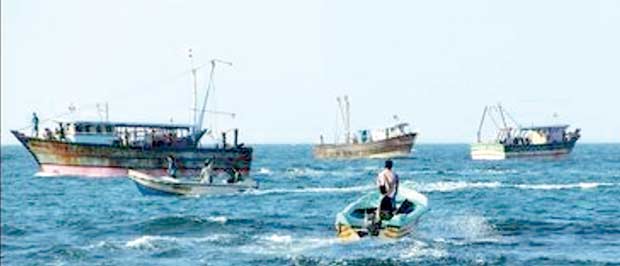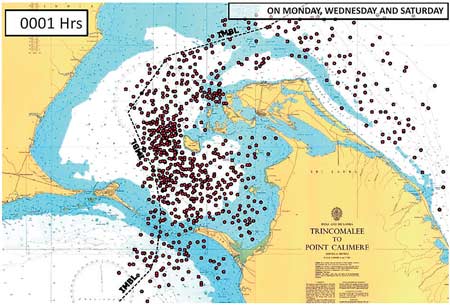
It is not always easy keeping up with the governments of India and Sri Lanka, as they navigate the national and the bilateral concerns that drive and are generated by Tamil Nadu trawlers persistently fishing illegally in Sri Lankan waters. The last month or so has been more intriguing than most.
Two weeks ago a delegation of Tamil Nadu trawler owners met the External Affairs Minister, Sushma Swaraj, in Delhi. The trawler owners went to Delhi to ask the union government to intervene on behalf of Indian trawler fishermen arrested by the Sri Lankan authorities. According to Indian press reports the minister told the trawler owners that the Government of India respected the International Maritime Boundary between India and Sri Lanka and they should too. The trawler owners left Delhi with empty nets and worse, with clear instructions from Delhi to stop fishing illegally in Sri Lankan waters.
A week later in Chennai the Indian Coast Guard (ICG) was summoned to the Madras High Court by lawyers representing Tamil Nadu trawler owners, for not obeying an earlier court order to provide security for Indian trawler fishermen. In its counter-affidavit the Deputy Director General of the ICG, K.R. Nautial, informed the Court that Indian fishermen had never been attacked in Indian waters and that neither the ICG nor the Indian Navy permitted any Sri Lankan vessel to come into Indian territory. Moreover the ICG accused Tamil Nadu trawlers of using banned methods of fishing in Sri Lankan waters; using high-power motors causing damage to Sri Lankan fishing gear; smuggling contraband, including drugs and other unlawful activities like mid-sea attacks by Indian fishermen on their counterparts. The Court was further informed that the ICG had evidence to show that Tamil Nadu trawlers had breached Sri Lankan sovereignty 36,865 times in 2014 up to March 2015.
"Closer to home a meeting was organized by northern Sri Lankan fishermen’s leaders in Vavuniya last weekend. Fishermen’s representatives met to discuss how northern fishermen will respond, if Tamil Nadu trawlers resume fishing illegally in Sri Lankan waters, when the Indian government’s annual 45 day ban on mechanized fishing comes to end on the 16th of May"
Closer to home a meeting was organized by northern Sri Lankan fishermen’s le

At 1.00 a.m. Sri Lankan territorial waters are fully dense with
Tamil Nadu trawlers |
aders in Vavuniya last weekend. Fishermen’s representatives met to discuss how northern fishermen will respond, if Tamil Nadu trawlers resume fishing illegally in Sri Lankan waters, when the Indian government’s annual 45-day ban on mechanized fishing comes to an end on the 16th of May. The Sri Lankan President’s decision last week to release 37 Indian trawler fishermen without charge was also discussed. According to Indian press reports, the Sri Lankan President made his decision after holding private talks with a delegation of six Indian trawler owners – all advocates of illegal fishing in Sri Lankan waters - organized by the Minister of Resettlement D. M. Swaminathan.
In Vavuniya M. M. Alam the President of the Mannar District Fishermen’s Association said that the Indian trawler owners didn’t only ask the President to release the 37 Indian trawler fishermen. They also asked the government to consider issuing 300 fishing licences to Tamil Nadu trawler owners, so that they could fish legally in Sri Lankan waters. According to Alam, when this suggestion was proposed by the Fisheries’ Ministry officials to northern fishermen in Colombo recently, the fishermen’s leaders rose in unison and left the meeting.
While Tamil Nadu trawler owners were having tea with the President, lawyers representing northern fishermen were filing action against the government in the Supreme Court. Northern fishermen are seeking the Supreme Court’s discretion to over-rule the recent Court of Appeal judgment, which found no fault with the Attorney General for arresting and remanding (and releasing without charge) Tamil Nadu trawler fishermen for violating Sri Lanka’s immigration laws. The petition argues that the Attorney General’s decision to arrest and remand Indian fishermen for entering Sri Lanka without a visa - rather than prosecuting them for violating the Foreign Fishing Vessel Act - is contrary to Sri Lankan law.
The commitment shown recently by the Indian government and the Judiciary to compel Tamil Nadu trawler owners to fish in compliance with international maritime law, needs to be reciprocated by the Sri Lankan government. To achieve this and uphold the sovereignty of Sri Lanka, the Sri Lankan authorities must arrest, remand and prosecute Tamil Nadu trawler owners for illegal fishing, under the Foreign Fishing Vessel Act: if necessary 36,865 times.

